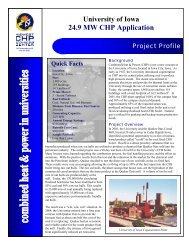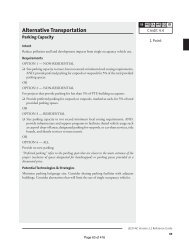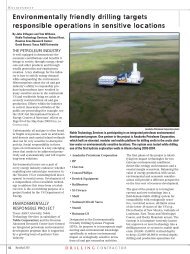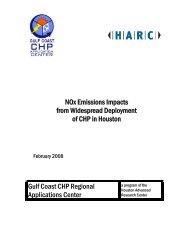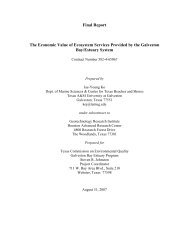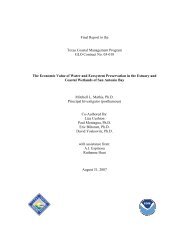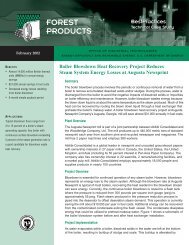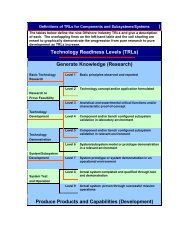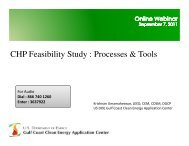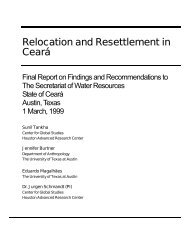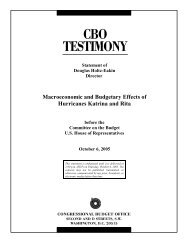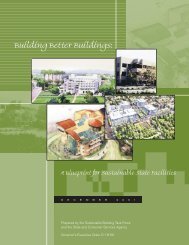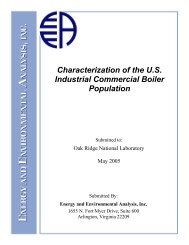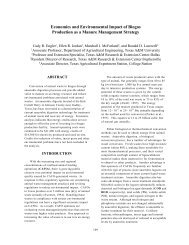The Impact of Air Quality Regulations on Distributed ... - NREL
The Impact of Air Quality Regulations on Distributed ... - NREL
The Impact of Air Quality Regulations on Distributed ... - NREL
You also want an ePaper? Increase the reach of your titles
YUMPU automatically turns print PDFs into web optimized ePapers that Google loves.
3.2.2 Texas<br />
On May 23, 2001, the Texas Natural Resource<br />
C<strong>on</strong>servati<strong>on</strong> Commissi<strong>on</strong> (TNRCC) approved<br />
new air emissi<strong>on</strong>s standards 29 for small electric<br />
generating units. <str<strong>on</strong>g>The</str<strong>on</strong>g> standards are divided<br />
between east and west Texas. <str<strong>on</strong>g>The</str<strong>on</strong>g> rule also<br />
addresses system size and capacity factors.<br />
Parts <str<strong>on</strong>g>of</str<strong>on</strong>g> East Texas have the worst air quality in<br />
the nati<strong>on</strong> and therefore already have very<br />
stringent limits for emissi<strong>on</strong>s from all sources.<br />
For units 10 MW or less installed in east Texas<br />
29 http://www.tnrcc.state.tx.us/permitting/airperm/nsr_permits/fi<br />
les/segu_final.pdf<br />
27<br />
prior to 2005 and operating more than 300<br />
hours per year, the limit is 0.47 lb<br />
NOx/MWh. This is slightly lower than the<br />
2003 CARB certificati<strong>on</strong> standard and can<br />
currently be met <strong>on</strong>ly by very low-emitting<br />
gas engines, microturbines, and fuel cells.<br />
<str<strong>on</strong>g>The</str<strong>on</strong>g> 2005 limit <str<strong>on</strong>g>of</str<strong>on</strong>g> 0.14 lb/MWh can <strong>on</strong>ly be<br />
met today by fuel cells. A market study is<br />
being performed to see whether the 2005<br />
standard is appropriate. For units operating<br />
less than 300 hours per year, the limit is 1.65<br />
lb/MWh, declining to 0.47 lb/MWh in 2005.<br />
Table 3-5<br />
Texas NOx General Permit Limits for Units less than 10 MW<br />
Installed Prior to 2005 Installed In 2005 or Later<br />
East Texas<br />
Operates more that 300 hrs/yr 0.47 lb/MWh 0.14 lb/MWh<br />
Operates less than 300 hrs/yr 1.65 lb/MWh 0.47 lb/MWh<br />
West Texas<br />
Operates more than 300 hrs/yr 3.11 lb/MWh 3.11 lb/MWh<br />
Operates less than 300 hrs/yr 21 lb/MWh 21 lb/MWh<br />
<str<strong>on</strong>g>The</str<strong>on</strong>g> west Texas requirements for units 10 MW<br />
or less are not as stringent. <str<strong>on</strong>g>The</str<strong>on</strong>g> limit <str<strong>on</strong>g>of</str<strong>on</strong>g> 21<br />
lb/MWh for units operating 300 hours per year<br />
or less can be met by diesel engines and most<br />
other DG technologies. <str<strong>on</strong>g>The</str<strong>on</strong>g> 3.11 lb/MWh limit<br />
for higher-capacity-factor units can be met by<br />
combusti<strong>on</strong> turbine technologies and many<br />
lean-burn gas engines.<br />
<str<strong>on</strong>g>The</str<strong>on</strong>g> Texas rule allows a DG project that<br />
employs CHP to take a credit based up<strong>on</strong> the<br />
amount <str<strong>on</strong>g>of</str<strong>on</strong>g> heat recovered. <str<strong>on</strong>g>The</str<strong>on</strong>g> credit is 1<br />
MWh for each 3.4 MMBtu <str<strong>on</strong>g>of</str<strong>on</strong>g> heat<br />
recovered. <str<strong>on</strong>g>The</str<strong>on</strong>g> thermal output must be at<br />
least 20% <str<strong>on</strong>g>of</str<strong>on</strong>g> the total output.<br />
<str<strong>on</strong>g>The</str<strong>on</strong>g> Texas and California rules are<br />
examples <str<strong>on</strong>g>of</str<strong>on</strong>g> new approaches to DG<br />
regulati<strong>on</strong> that <str<strong>on</strong>g>of</str<strong>on</strong>g>fer simpler treatment but<br />
set limits that are not achievable by<br />
today’s c<strong>on</strong>venti<strong>on</strong>al DG technology.



